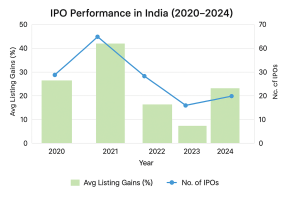
IPO Basics: What You Must Know Before You Invest
IPO Basics: What You Must Know Before You Invest
An Initial Public Offering (IPO) is often seen as a golden ticket to early wealth creation.
But before you invest your hard-earned money into an IPO in India, it’s crucial to understand the fundamentals, risks, and strategies behind it.
In this beginner-friendly guide, we’ll walk you through everything you must know about IPOs — explained simply, without jargon.
What is an IPO?
An IPO is when a private company offers its shares to the public for the first time by getting listed on a stock exchange like NSE or BSE.
When you invest in an IPO, you are buying ownership in a company at an early stage of its public journey.
✅ If the company grows, your investment grows.
⚠️ If the company struggles, your money could shrink.
Why Do Companies Launch IPOs?
- To raise fresh capital for business expansion
- To pay off debts
- To give early investors (founders, VCs) a chance to cash out
- To gain public visibility and trust
In short, an IPO helps a company grow bigger and stronger, but it also comes under greater public scrutiny.
Types of IPO Investors
- Retail Investors: Individual investors like you and me (Reservation: 35%)
- Qualified Institutional Buyers (QIBs): Mutual funds, insurance companies, etc. (Reservation: 50%)
- Non-Institutional Investors (NIIs): High-net-worth individuals (Reservation: 15%)
Retail investors often get special quota benefits and discounts in IPO allotments.
How to Apply for an IPO in India (Through GWC India)
- Open a Demat & Trading Account at GWC India
- Log in and select the IPO you want to apply for.
- Enter your bid details (price and quantity).
- Make payment via UPI.
- Wait for allotment results to be announced.
Key Terms You Should Know Before Investing
| Term | Meaning |
| Offer Price | Price at which shares are offered to investors |
| Lot Size | Minimum number of shares you must apply for |
| Issue Size | Total amount the company wants to raise |
| Grey Market Premium | Unofficial price trend before official listing |
| Listing Gains | Profit earned if the stock lists higher than the issue price |
IPO Investing: What You Must Check Before Applying
Before you rush into the next hyped IPO, always check:
🔍 Company’s financial health (Profit/Loss trends)
🔍 Strength of management and promoters
🔍 Purpose of raising funds (expansion vs debt repayment)
🔍 Valuation — is it reasonably priced?
🔍 Peer comparison with listed competitors
🔍 Market sentiment (Is it a bull or bear market?)
Advantages of Investing in IPOs
🚀 Chance to invest early in future leaders
🚀 Potential listing gains on Day 1
🚀 Portfolio diversification
Risks of Investing in IPOs
⚠️ Overhyped companies may crash post-listing
⚠️ No past market performance history
⚠️ Possibility of lower-than-expected allotments
⚠️ Lock-in periods for certain IPO categories
Always balance opportunity vs risk when considering IPOs.
How IPOs Have Performed Recently
Here’s a quick look at IPO listings performance in India over the past few years:

Quick Tips for First-Time IPO Investors
- Invest only what you can afford to lock away for a few months.
- Don’t blindly invest based on grey market premiums.
- Read the Red Herring Prospectus carefully.
- Prefer companies with strong fundamentals, not just brand value.
Final Thoughts: IPOs Are Exciting, But Be Cautious
- Investing in IPOs can be a great way to ride a company’s success story from an early stage.
However, discipline, research, and patience are key to making wise IPO investments. - With a trusted platform like GWC India, your IPO investing journey becomes easy, secure, and transparent.
- Open your GWC India account today and grab upcoming IPO opportunities smartly!

